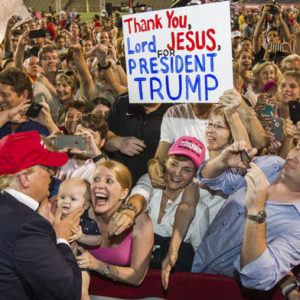Left-leaning, mainstream media outlets like Politico, NPR and The New York Times seem to think Trump’s decision to withdraw troops from Syria threatens his 2020 reelection bid based on comments from televangelists like Pat Robertson.
“Trump faces an existential threat with evangelicals” reads the Politico headline, relying on a few comments from Robertson and an unnamed “longtime Trump friend” to make the case for why evangelicals might seriously consider not voting for Trump over his abandonment of the Kurds.
“Trump could lose evangelical support over Turkey-Kurds issue,” reads the NPR story’s headline, which also cites a Fox News poll claiming that evangelicals are upset over Trump’s Syria decision.
“Are the cracks showing in Trump’s support of evangelicals?” reads The Washington Post’s headline. The reporter then cites polling data that 3 in 10 evangelicals disapprove of Trump … which shows that the majority still approve of him as president and want to keep him in office.
There’s a difference between what Christian celebrities like Pat Robertson say and what American Christians actually care about, and not even polls paint a complete picture.
But polling and three of the most popular Christian news sites consistently show that American Christians care deeply about the economy, religious liberty and abortion. That’s why they voted for Trump in 2016 and that’s why they’ll vote for him again in 2020.
A quick perusal of headlines from Christianity Today, First Things and WORLD Magazine — three of the most popular, conservative Christian news and analysis websites — reveal a pretty consistent theme: American Christians are concerned about religious liberty and they think Trump protects them by stacking courts with conservative judges, and they constantly push for anti-abortion laws and support Trump’s moves on abortion issues.
WORLD magazine frequently covers court cases relating to religious liberty over health care issues like abortion and gender-transition services, as well as lawsuits regarding whether Christians can deny services to LGBT people.
“Court decision protects religious health care workers” reads a recent headline about a Bush-appointed judge throwing out an Obama-era regulation that “required all medical professionals to perform abortions and gender-transition services despite religious convictions.”
The Department of Health and Human Services also issued a final conscience rule this year under Trump’s May 2017 protecting religious freedom, allowing medical professionals to refrain from offering services that contradict their religious convictions, like abortions, sterilizations or assisted suicide.
Other recent WORLD headlines read, “Trump administration protects Christian foster agencies,” “Trump tackles religious persecution,” “Religious liberty gaining momentum in court,” and a recent feature’s headline reads, “Surrendering to the state: When state officials demanded U.S. foster agencies place children with same-sex couples, Catholic agencies refused. The largest evangelical agency did not.”
Similarly, Christianity Today ran a story praising Trump’s 2017 rules exempting religious employers from offering birth control coverage. An August CT story highlights how American Christians rejoiced when the Trump administration cut Title IX funding, because it crippled abortion-provider Planned Parenthood.
When Trump announced Brett Kavanaugh as his pick for the Supreme Court, Christianity Today ran a celebratory feature describing Kavanaugh as “another religious liberty defender.”
And then there’s First Things: in a May 2019 article, Deputy General Counsel for the First Liberty Institute wrote, “Two years into Donald Trump’s presidency, conservative religious voters who supported him despite reports of his personal immorality appear to have been vindicated. Religious freedom has turned out to be, as candidate Trump promised, one of President Trump’s chief priorities. And he has prioritized it to good effect.”
In a May 2017 First Things article, Carson Holloway, a conservative Christian and professor of political science at the University of Nebraska, wrote, “For most [Christians], the calculation [in 2016] was straightforward. The end — protecting ourselves, our children, and our country from an increasingly hostile progressivism — justified the means, the Trump presidency.”
Poll data from LifeWay Research found that white evangelicals ranked jobs/improving the economy as the No. 1 reason they voted for Trump in 2016. But Pew Research Center data also shows that 52 percent of white evangelicals considered abortion a “very important” voting issue in 2016, and 70 percent considered Supreme Court appointments a “very important” issue in 2016.
The economy and health care usually top every list of voter issues, and foreign policy tends to fall much farther down the list.
Furthermore, according to the most recent PPRI poll, 76 percent of white evangelicals approve of Trump’s job performance.
Given the polls showing white evangelicals prioritizing the economy and Christian publications consistently celebrating Trump’s efforts to crack down on abortion and allow Christians to deny services to those who identify as LGBT, liberals should expect white evangelicals to support Trump again in 2020 — Kurds or no Kurds.

